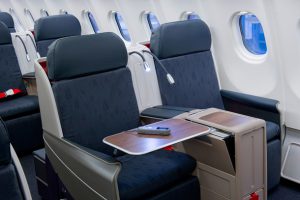Bidding for upgrades decreases the value of elite status for frequent flyers, but it also presents opportunities for non-elites to snag an upgrade on the cheap.
Like it or not, the frequent flyer universe is looking more and more like the domain of the highest bidder. Scott McCartney of The Wall Street Journal reports (subscription required) that auctioning seat upgrades has become more and more common over the past year or so, for better or for worse.
So what does this new, Darwinian approach to snagging one of the central perks of elite status mean for customers? Let's take a look.
Bidding for Upgrades
Each airline's auction works more or less the same way, and The Points Guy has a pretty useful guide. Typically you'll receive an email telling you whether or not your booking is eligible in the first place (you can also check on your airline's website), at which point you can log in to see the minimum and maximum bids set by the airline as well as a leaderboard showing the current top bid. Auctions usually end 24 to 72 hours before departure, but some can run right up to boarding.
Currently these auctions are offered mostly by international airlines, with roughly 30 carriers, including big names like Lufthansa, Cathay Pacific, Aer Lingus, and Virgin Atlantic, running some kind of auction program. Domestically, Virgin America is testing in-airport auctions at its Las Vegas gates and Hawaiian plans to add auctions soon. American has experimented with it and other major U.S. carriers seem to be taking a wait-and-see approach.
RELATED: Air Passenger Study: Flyers Happy to Pay for Upgrades. Really?
Now, what's the "why" behind this? In short, airlines are doing this because (surprise!) it's an opportunity to make more money by cutting down on the number of free upgrades they currently hand out, especially for domestic flights.
But airlines are also doing this simply because they can. Writes McCartney, "Airline mergers have consolidated the armies of travelers with elite status, so even top-tier flyers are competing with many others for a couple of empty first-class seats each flight." Basically: Less competition equals less choice for consumers. Stop me if you've heard that before.
But before you cry foul, consider that this isn't an entirely bad thing for the traveling public. Business- and first-class fares are notoriously expensive, to the point that even winning the bid for an upgrade on top of the economy fare you already bought may end up costing less than purchasing the ticket outright.
In a sense, you're no longer beholden to the airline's fare structure, but rather to pure supply and demand. And for lower-tier elites, who would normally not have access to the same seat upgrades as upper-tier flyers, it's an opportunity to spend your way into that upper-level flight experience.
By the same token, the auction approach threatens the value of achieving that upper-tier status. What's the point of flying all those miles if some barely-elite traveler can snatch up what was formerly your hard-earned upgrade? There are, of course, more benefits to being super-elite beyond seat upgrades, but one wonders how far airlines can go before they completely erode the value of their upper echelon tiers.
Readers, what do you think? Would you ever bid for a seat upgrade? Do you think this is a boon for frequent flyers or a bust?
More from SmarterTravel:
- How to Beat Hotel Bidding Sites in Nine Steps
- Bidding for Upgrades Now Officially an Air Travel Trend
- Bidding for Bumping
Read the original story: How to Get a Cheap Upgrade on Your Next Flight by Carl Unger, who is a regular contributor to SmarterTravel.






